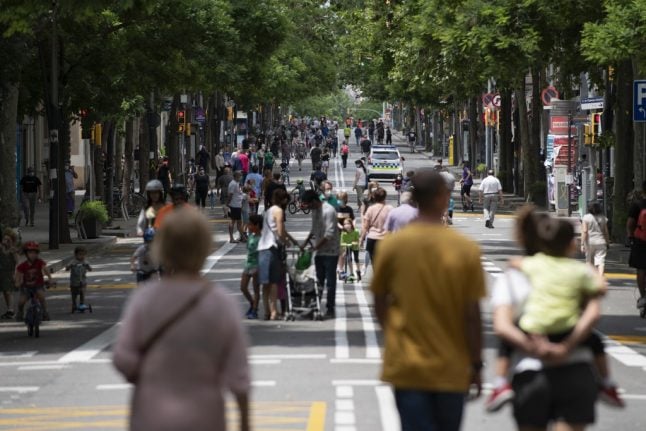On April 26th, Spain recorded its highest one-day infection rise: 9,181 new cases.
On Thursday May 28th that figure was down to 182 over a 24-hour period.
The same encouraging comparison can be drawn when looking at the day with the highest death toll – 950 deaths on April 2nd – a grim figure which plummeted to just one fatality on Thursday.
The health ministry’s stats are proof that Spain’s lockdown and ensuing PPE and social distancing measures have worked well in a country where crowds and displays of physical affection were once the norm.
But a growing number of towns and cities are either being forced to take a step back in the lockdown phases or have come close to this as a result of a spike in infections caused by citizens not respecting the rules.
There was the case two weeks ago of a birthday party in the Catalan city of Lleida where all 20 guests (the maximum number of people legally allowed to gather was 10) resulted in everyone getting infected. Since then, 187 people in Lleida have been admitted to ICU.
A mass funeral procession through the streets of the town of Guía de Isora in Tenerife also ended up with all nine family members contracting Covid-19.
The video below shows how the safety distance of one to two metres wasn’t respected, nor was the mandatory use of face masks for such a large congregation.
Entierro ayer en Guia de Isora, Tenerife, más de 25 personas, sin distancia de seguridad, sin mascarillas la gran mayoria y con la connivencia de un Ayuntamiento que apenas unos dias antes controlaba los entierros de otras familias #LutoOficialESP pic.twitter.com/WSH9fGtbpX
— RagerGirl (@GirlRager) May 27, 2020
Similar occurrences have been reported in Totana (Murcia), Cuenca in central Spain, in Leganés on the outskirts of Madrid and in the Spanish enclave of Ceuta in northern Africa, the latter having the most worrying spike with 271 people currently placed under home quarantine.
Fortunately, the quick detection of these new outbreaks has meant that they “have been very well controlled and we should not assume that there has been any cross-community transmission,” Spanish emergencies coordinator Fernando Simón told journalists.
“We’re on the right track, even faster than other countries,” Spanish Health Minister Salvador Illa added.
“But we must remain cautious as we cannot take a step back and put ourselves at risk again and prevent further progress”.
Illa stressed that according to his ministry’s findings, the chances of new major outbreaks in Spain would be in autumn, “in the worst case scenario, and without a vaccine yet.”
Spain has reported a total of 38 deaths from Covid-19 over the past seven days.
The country’s total death toll for the coronavirus stands at 27,119.



 Please whitelist us to continue reading.
Please whitelist us to continue reading.
Meanwhile on the island of Lanzarote, a man who had tested positive for the virus in Madrid but didn’t bother to wait for his test results and boarded a plane in Madrid and flew to Lanzarote, where there have been no new cases or deaths for a month. Luckily he was met off the plane by the Guardia Civil, who had been informed of the man’s covid status. All the passengers on the plane have now been put into quarantine. Just shows how easy is is for one person to undo all the good that an entire island population has done over the past 2 months. This man could have single-handedly set off a new wave of the virus in Lanzarote, which could have quickly spread to surrounding islands.